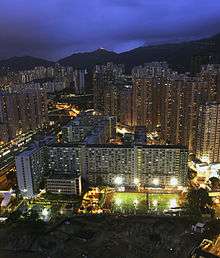Lower Ngau Tau Kok (II) Estate
Lower Ngau Tau Kok (II) Estate (Chinese: 牛頭角下邨(二區) or 牛頭角下(二)邨) was a 7-block public housing estate built on reclaimed land[1] in Ngau Tau Kok, Kwun Tong, Kowloon, Hong Kong, located opposite Kowloon Bay Station on the MTR . The demolition of the estate started in March 2010. The estate, along with the Lower Ngau Tau Kok (I) Estate, which was demolished in June 2004, formed the Lower Ngau Tau Kok Estate. A new estate, retaining the name Lower Ngau Tau Kok Estate, is being constructed on the site.


The estate was often described as the last resettlement estate in Hong Kong.
History
Lower Ngau Tau Kok Estate was built in the 1960s as a resettlement estate. Ngau Tau Kok Estate was split into Lower Ngau Tau Kok Estate and Upper Ngau Tau Kok Estate in 1973. Blocks 8 to 12 were the first resettlement blocks in Hong Kong to be built with prefabricated parts.[2] Year of intake for Lower Ngau Tau Kok (II) Estate was 1967.[2][3] The first half of the original estate, Lower Ngau Tau Kok (I) Estate, was demolished in 2004. The demolition works of the remaining half, Lower Ngau Tau Kok (II) Estate, started in March 2010 and are being conducted by the China State Construction Engineering (Hong Kong) Limited.
Features

Lower Ngau Tau Kok (II) Estate comprised 5,400 flats in seven Mark V resettlement blocks.[2][3] Apartment sizes ranged from 8.2m2 to 39.4 m2.[3]
Lower Ngau Tau Kok Estate was among the first group of resettlement estates built with lifts. Lifts from the ground floor could reach the 8th and the 13th floors.[2]
Lower Ngau Tau Kok Estate was also known for its dai pai dongs and cha chaan tengs, as well as the bazaars and shops surrounding each block.
Final months
In the last months before its evacuation, Lower Ngau Tau Kok (II) Estate had 3,100 households and 160 commercial tenants. People living and working there complained about the nuisance created by the many people visiting the old estate before its evacuation.[4]
Memory
The Housing Authority has commissioned local photographers and video production companies to document the buildings and the life of their occupants. A cultural path will be built at the new Lower Ngau Tau Kok Estate to house the relics of the old estate.[5]
Other than those commissioned by the Housing Authority, many local residents and tourists paid visits to the estate. Most of them took photos and videos in the estate, and had a meal in the estate's many restaurants.
Redevelopment
The Lower Ngau Tau Kok Estate will be six blocks of housing estate which consists more than 30 storeys and the maximum height will be 46 storeys. They were completed in 2012.
Part of the site of the former estate will also be used for the construction of the East Kowloon Cultural Centre, slated to open in 2021.
Notable residents
Lee Wai Sze, Hong Kong track cyclist, Silver medalist in 2012 London Olympics.
See also
- Upper Ngau Tau Kok Estate
- Bishop Paschang Memorial School
- Public housing estates in Ngau Tau Kok and Kowloon Bay
- Shek Kip Mei Estate, a resettlement estate demolished in 2006, except for one block, which has been listed as a "Grade I historic building"[6]
- Public housing in Hong Kong
- List of public housing estates in Hong Kong
References
- Map of Victoria Harbour Archived 2011-05-14 at the Wayback Machine
- Hong Kong Housing Authority - Historical Background of Lower Ngau Tau Kok (II) Estate
- Hong Kong Housing Authority - Lower Ngau Tau Kok (II) Estate
- Sun, Celine (9 April 2009). "Warning on Ngau Tau Kok nostalgia visits". South China Morning Post. Retrieved 6 December 2015.
- "Housing estate expo opens", July 11, 2009 Archived July 24, 2009, at the Wayback Machine
- List of Graded Historic Buildings in Hong Kong (as at 7 Nov 2008) Archived 2011-07-09 at the Wayback Machine
External links
| Wikimedia Commons has media related to Lower Ngau Tau Kok Estate. |
- Exhibition website: "Dine at Lower Ngau Tau Kok Estate - Farewell to the Last Resettlement Public Rental Housing Exhibition"
- HK Magazine article: "Executors of the Estate", March 13th, 2009
- Time Out Hong Kong article about the estate and the exhibition
- A photo record of LNTK by photographer John Choy